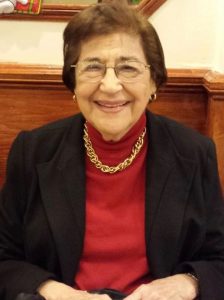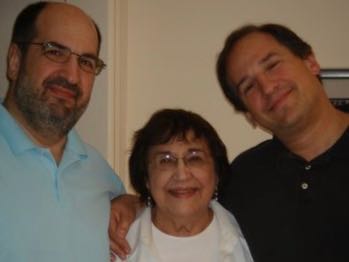
During my radio career, I interviewed thousands of people. I was never nervous about talking to any of them, except one.
My mother.
In June, 1991, Mom was winding up a 20+ year career at Herricks High School on Long Island, where she served as Head Librarian and Media Specialist. While there, she set a new standard for how school librarians helped students by coordinating with teachers regarding assignments and instructing kids on how to do research.
To honor her, I decided to call Mom, live on the air, to congratulate her on her retirement. Although my father and brother had made appearances on my show, this would be a first for Mom. When I say I was nervous, I mean my hands were literally shaking as I pushed the buttons on the phone and ran the control board. When the front office person at the school connected me to the library, Mom picked up right away. I told her why I was calling and joked that we were live on the air so she shouldn’t curse, something I’d never actually heard her do in real life. She was stunned but gracious as my colleagues on the show chimed in with congratulations. Then I told her how proud I was of her, and she responded by deflecting the praise and instead saying how proud she was of me, asking, “Are your ratings still good?”
Everyone in the studio laughed, and I bet some listeners did, too. Anyone who knew Mom could tell you that was typical of her. She always cared more about others than about herself, and she loved helping people learn. That’s why, not long after leaving the school district, she became a part-time reference librarian at a nearby public library, where she worked well into her eighties. Whether it was working with kids to figure out unique ways for them to do reports and essays for school, or taking a daily call from a woman who couldn’t read TV Guide because she was losing her sight but wanted to know what she should watch that night, Mom was there to help.
Several years ago, Mom couldn’t drive or work anymore, but still lived by herself on Long Island. She began needing more assistance — particularly with all things electronic — which my brother Seth and I provided from afar before finally moving her into an assisted living facility in Maryland. She was comfortable but beginning to get confused, and by the end of 2017 had fallen into the grip of Alzheimer’s Disease. I continued to call her a couple of times a week to check in, but I wasn’t nervous in the same way I’d been all those years ago on the air. Now I was worried about how she was doing, whether her mind had deteriorated more since the last time we’d spoken, and whether she could still understand what I told her about what was going on in our lives.
Mom died this week, just shy of her 95th birthday.
My wife and daughter and I went to Maryland to be with her (and Seth and his wife) over those last few days, but by then she was no longer the woman we’d known. We were all prepared — it hadn’t happened suddenly, after all — so by the time the end came, it was with a mixture of mourning and relief.
Mom lived a remarkable life, most of it in the New York City area, where she was born. Her parents, working-class immigrants from Eastern Europe, had raised her with an emphasis on education and social justice. She grew up in an atmosphere of progressive politics, trade union activism, secular Judaism, and Yiddish culture, which she studied all the way through high school. She and Dad raised us with those same values. While friends and neighbors attended temple and learned Hebrew on their way to a Bar Mitzvah, Mom saw to it that we attended North Shore Kinder Shule, where we learned Yiddish on the way to a non-religious graduation ceremony at age thirteen.
Until then, although we all spoke English in our daily lives, she and Dad used Yiddish as a secret language they conversed in when they didn’t want us to understand what they were saying. When we started to catch on, they merely switched to French, a language they’d become fluent in when they lived in Paris for a few years in the early 1950s. Mom’s love of Yiddish continued into her senior years, when she gathered with others for a monthly book club where they read and spoke the language of her youth.
That time in France began Mom’s lifelong love affair with experiencing other parts of the world. She and Dad went to dozens of countries and, even after he died in 1997, she continued to travel (both domestically and internationally) for another decade or more. Mom believed that soaking up other cultures, seeing the sights, and meeting the people brought human beings together and reduced animosities. She passed on that passion to Seth and me, and we have carried on the tradition and shared similar adventures with our own children.
Mom had a passion for folk music, often attending hootenannies in Manhattan with Pete Seeger, Woody Guthrie, and their peers. Later, as I grew up in the rock era, I’d play Bob Dylan and Paul Simon songs for her, and she’d help me understand the roots of their music. She also loved opera, ballet, and musicals (on her first date with Dad, they saw “Oklahoma” on Broadway).
Always an activist, she and Dad stood with Paul Robeson at Peekskill. She marched for civil rights. Mom took me to Washington, DC, around 1970 to join a national march against the Vietnam War.
While raising the two of us, she also took night classes and earned her Masters in Library Science in the late 1960s and became a proud member of the National Education Association and New York State United Teachers. Oh, and did I mention she lasted four days on “Jeopardy!” in 1967?
Her run happened to air during the week we were off from school for spring break, so we got to see her win $1,950 (equivalent to almost $40,000 in today’s game). Her streak ended when she didn’t know the correct response to the Final Jeopardy clue: “T stands for this in Booker T. Washington’s name” (spoiler alert: it’s Taliafero). You can read more about her experience on the show here.
She also raised two successful sons. She may have flinched and swallowed hard when I told her I was dropping out of college to take a job at a radio station that only paid $90/week, but she was outwardly supportive — then and over the four decades of my career. She was also tremendously proud of Seth as he became a union activist, consulted on numerous political campaigns, earned his law degree, worked in both the Clinton and Obama administrations, and rose to become Deputy Secretary of the US Department Of Labor.
I’m especially happy that Mom had a close relationship with my daughter, her first grandchild, whom she referred to as “zeiskeit” (Yiddish for “sweet one”). Since they both lived in New York for several years, they met often for lunch or to attend shows and other events. She loved spending time with Seth’s two sons, also.
Those are the memories of Mom that have been racing through my head the last few days — not as the confused old woman of her final years, but as the warm, giving, caring, and compassionate woman for whom family, friends, and others always came first.
In lieu of flowers, please consider a donation in Martha Harris’s honor to either of two organizations she strongly supported: Yivo Institute for Jewish Research and/or Camp Kinderland.

